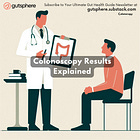Beyond the Procedure: Comprehensive Post-Colonoscopy Care Guide(Part 8/10)
Advice on recovery and post-procedure care, managing discomfort, and when to seek medical attention
Welcome Gutsphere Community!
Introduction
Welcome to an essential phase of your health journey with us. Whether you’re a patient who’s recently undergone a colonoscopy, a caregiver providing invaluable support, or someone seeking knowledge about the process, this guide is crafted for you. Understanding the nuances of recovery is pivotal for the well-being of both patients and caregivers. Our aim is to equip you with actionable, empathetic guidance, ensuring a path to recovery that is not only smooth but also well-informed.
To facilitate an easy-to-follow journey, we’ve developed a comprehensive User Guide and Checklist. This toolkit is designed to navigate you through each step of the recovery process, empowering you with clarity and confidence. Let’s embark on this recovery journey together, fostering a supportive environment for healing and health.
Navigating Your Recovery: An Overview
Recovery is not just about waiting for sedation to wear off or your diet to normalize; it's an active process where informed choices lead to better outcomes. Let's dive into what you can expect and how best to manage this period:
1. The First 24 Hours: Immediate Post-Procedure Care
Rest and Relaxation:
Why It Matters: Sedation effects vary; giving your body time to recover is essential.
Actionable Steps: Plan a quiet day. Engage in light reading or listen to soothing music. Avoid making important decisions or operating machinery.
Hydration:
Why It Matters: Fluids are crucial after the prep and procedure.
Actionable Steps: Keep water within reach. Consider setting reminders to drink regularly.
First Meal and Diet Resumption:
Why It Matters: Your digestive system needs gentle reintroduction to regular foods.
Actionable Steps: Start with broth, yogurt, or jelly. Gradually add solid foods as tolerated over the next days. Listen to your body—if something doesn't feel right, step back to lighter options.
Activity Level:
Why It Matters: Too much too soon can lead to discomfort or complications.
Actionable Steps: A short, gentle walk indoors can aid digestion and gas relief. Postpone your return to the gym or heavy lifting tasks.
Alcohol, Work, and Driving:
Why It Matters: Residual sedation effects can impair your ability to drive, work, especially in jobs requiring sharp focus, and metabolize alcohol.
Actionable Steps: Avoid alcohol for at least 24 hours. Ensure you're fully alert before resuming work or driving—this usually means waiting until the day after your procedure.
Anesthesia Side Effects:
Why It Matters: Drowsiness, mild nausea, or throat discomfort may occur.
Actionable Steps: Stay hydrated, and eat light meals to alleviate nausea. Rest if you feel drowsy. Throat lozenges can help with any mild throat soreness.
2. Monitoring Symptoms: What's Normal and What's Not
Expected Symptoms:
Mild bloating and gas are normal as air is introduced during the procedure.
Actionable Steps: Gentle walking and warm baths can provide relief.
Warning Signs:
Severe abdominal pain, fever, or heavy bleeding are not normal.
Actionable Steps: Don't hesitate—seek immediate medical attention if you experience these symptoms.
Bowel Movements:
Your first bowel movement may take a bit longer than usual.
Actionable Steps: Maintain hydration and gradually increase dietary fiber. If constipation or diarrhea persists, contact your healthcare provider.
3. Medications and Chronic Conditions
Medication Resumption and Adjustments:
Most medications can be resumed, but let's double-check on those affecting blood coagulation or managing chronic conditions.
Actionable Steps: Consult with your doctor directly about when to restart each medication, especially if adjustments were made pre-procedure.
Chronic Condition Management:
Conditions like diabetes or hypertension may influence how you manage post-procedure symptoms.
Actionable Steps: Keep a close eye on symptoms that are out of the ordinary for your condition and communicate any concerns with your doctor.
4. Diet, Nutrition, and Gut Health
Hydration and Nutritional Support:
Rehydration is key, as is supporting your gut microbiome with a balanced diet.
Actionable Steps: Aim for at least eight 8-ounce glasses of water daily. Incorporate a diet rich in probiotics and fiber to support gut health. If probiotic foods don't agree with you initially, consider supplements after discussing with your doctor.
5. Emotional Well-being and Support
Emotional Well-being:
It's normal to feel a range of emotions post-procedure.
Actionable Steps: If feelings of anxiety or sadness persist, reaching out for support can help. You can ask for resources or referrals to professionals and support groups with your doctor.
6. The Road Ahead: Follow-Ups and Long-Term Care
Follow-Up Appointments and Results:
A follow-up is typically scheduled within a few weeks to discuss the results and any next steps.
Actionable Steps: Keep your follow-up appointment and prepare any questions you might have about your biopsy results or future screenings.
Long-Term Dietary and Lifestyle Changes for Gut Health:
Supporting your gut health is a long-term commitment.
Actionable Steps: Embrace a diverse, fiber-rich diet. Regular, moderate exercise and stress management techniques can also promote a healthy gut.
Post-Colonoscopy Care: A Comprehensive User Guide
Post-Colonoscopy Recovery Checklist
Conclusion
As we wrap up this comprehensive guide on post-colonoscopy care, we hope it serves as a beacon, illuminating the steps toward a swift and comfortable recovery. For patients and caregivers alike, navigating the recovery process with informed confidence is crucial to ensuring optimal health outcomes.
Warm regards,
Your Gutsphere Team
Request
Share
Our sincere request to you is to share the newsletter with your friends, family, and community so that they can benefit from the content. Also it will help us grow the newsletter, and eventually, as we release more content, digital tools, and more we will enable people around the world to live chronic disease free.
Subscribe
Feedback
Also, please give us feedback so that we can improve the content. And if there are any topics that you want us to cover please send us your questions and topics. Furthermore, if you try any of the things we provided information please share your experience with us.
Disclaimer
Please note that the information provided in this newsletter is for informational purposes only and should not be considered as a substitute for professional medical advice, diagnosis, or treatment. If you have any concerns or questions about our health, please consult with a licensed healthcare professional. The information contained in this newsletter is not intended to diagnose, treat, cure, or prevent any disease. The publisher and authors of this newsletter assume no responsibility for any adverse effects that may result from the use of the information contained herein.





